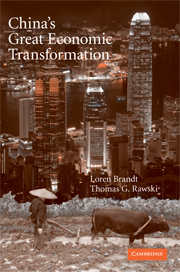Book contents
- Frontmatter
- Contents
- List of Figures
- List of Tables
- Contributors
- Acknowledgments
- Map
- 1 China's Great Economic Transformation
- 2 China and Development Economics
- 3 China in Light of the Performance of the Transition Economies
- 4 A Political Economy of China's Economic Transition
- 5 The Demographic Factor in China's Transition
- 6 The Chinese Labor Market in the Reform Era
- 7 Education in the Reform Era
- 8 Environmental Resources and Economic Growth
- 9 Science and Technology in China
- 10 The Political Economy of Private Sector Development in China
- 11 The Role of Law in China's Economic Development
- 12 China's Fiscal System: A Work in Progress
- 13 Agriculture in China's Development: Past Disappointments, Recent Successes, and Future Challenges
- 14 China's Financial System: Past, Present, and Future
- 15 China's Industrial Development
- 16 China's Embrace of Globalization
- 17 Growth and Structural Transformation in China
- 18 Income Inequality during China's Economic Transition
- 19 Spatial Dimensions of Chinese Economic Development
- 20 Forecasting China's Economic Growth to 2025
- Index
11 - The Role of Law in China's Economic Development
Published online by Cambridge University Press: 24 May 2010
- Frontmatter
- Contents
- List of Figures
- List of Tables
- Contributors
- Acknowledgments
- Map
- 1 China's Great Economic Transformation
- 2 China and Development Economics
- 3 China in Light of the Performance of the Transition Economies
- 4 A Political Economy of China's Economic Transition
- 5 The Demographic Factor in China's Transition
- 6 The Chinese Labor Market in the Reform Era
- 7 Education in the Reform Era
- 8 Environmental Resources and Economic Growth
- 9 Science and Technology in China
- 10 The Political Economy of Private Sector Development in China
- 11 The Role of Law in China's Economic Development
- 12 China's Fiscal System: A Work in Progress
- 13 Agriculture in China's Development: Past Disappointments, Recent Successes, and Future Challenges
- 14 China's Financial System: Past, Present, and Future
- 15 China's Industrial Development
- 16 China's Embrace of Globalization
- 17 Growth and Structural Transformation in China
- 18 Income Inequality during China's Economic Transition
- 19 Spatial Dimensions of Chinese Economic Development
- 20 Forecasting China's Economic Growth to 2025
- Index
Summary
INTRODUCTION
Economic growth requires economic agents to believe that political, social, and economic conditions are such that they can expect a reasonable return from their investments in property and from the agreements they make with others. Where such beliefs exist, they can arise as a result of many different mechanisms. Property owners might view government as constrained by law within a democracy or believe that a particular autocratic government has an interest in not expropriating property. Promisees might have blind trust in their fellow citizens or know that the court system will make appropriate judgments in case of a breach of contract. Therefore, in exploring the determinants of a country's growth performance, it is critical to understand which mechanisms fostered expectations among property owners and among those making agreements.
The emphasis in the recent economics literature, echoed in the pronouncements of the World Bank and similar organizations, is on formal institutions or the rule of law as crucial in fostering the appropriate expectations (Hall and Jones, 1999; Acemoglu, Johnson, and Robinson, 2001;Rodrik, Subramanian, and Trebbi, 2004). Such emphasis follows an important line of thought in institutional economics dating back to Max Weber and carried forth by Douglass North (1990), which we call here the rights hypothesis (Clarke, 2003b). This holds that economic growth requires a legal order offering stable and predictable rights of property and contract.
- Type
- Chapter
- Information
- China's Great Economic Transformation , pp. 375 - 428Publisher: Cambridge University PressPrint publication year: 2008
- 60
- Cited by

